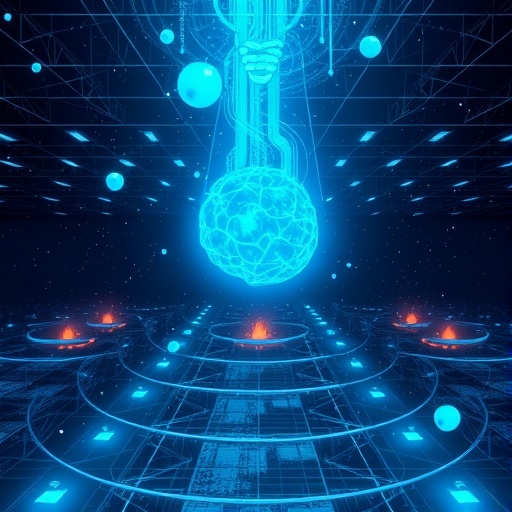In the realm of disaster management and response, the focus has increasingly shifted towards not only physical safety but also the psychological wellbeing of affected populations. This attention to mental health, especially in the aftermath of traumatic events, is crucial as psychological distress can have long-lasting impacts. Recent research articulated by Fattahipour, Sharififar, and Teymouri sheds light on an innovative approach that amalgamates artificial intelligence (AI), spirituality, and psychology, proposing a novel angle towards promoting mental health in disaster scenarios.
The research presents a SWOT analysis, laying out the strengths, weaknesses, opportunities, and threats associated with integrating these three components. The idea is to utilize AI’s analytical capabilities to predict and assess mental health needs following disasters while incorporating spiritual element which is often a significant aspect of many cultures. The psychological framework supports the overall approach, drawing from established principles and techniques in mental health practices. This triadic model offers a unique perspective on how to offer support and guidance to individuals facing the devastating effects of such events.
Strengths of this integrated approach include the potential for enhanced data collection and processing through AI. Machines can learn patterns in traumatic responses, deliver personalized interventions, and aid in resource allocation to ensure efficient mental health support. Spirituality, on the other hand, can provide individuals with coping mechanisms and community connections, facilitating resilience. Psychology complements these efforts by offering scientifically grounded methodologies aimed at treating psychological trauma.
However, the research does not shy away from recognizing the weaknesses inherent in this hybrid model. One concern is the reliance on technology, which can be a double-edged sword. While AI offers significant advantages in data analytics, it lacks the emotional intelligence and human empathy necessary for effective psychological support. Furthermore, the spiritual dimension of healing can be subjective, potentially leading to inconsistencies in its application across different communities and belief systems.
Opportunities are plentiful in this emerging field. The ever-growing capabilities of AI present a chance for innovations in how societies prepare for and respond to disasters. By leveraging data analytics, mental health interventions can be tailored to community-specific needs, acknowledging the unique challenges faced in different regions. Additionally, advancements in telehealth can serve as a bridge for accessing mental health services, particularly in areas where traditional forms of therapy may be limited or unavailable.
Despite these opportunities, threats linger on the horizon. Ethical considerations surrounding data privacy and the potential for misuse of AI technology in an already vulnerable population are paramount. The advancement of AI must prioritize the dignity and rights of individuals seeking help, ensuring that enhancements in service do not come at the cost of increased surveillance or control.
By systematically analyzing the interplay between AI, spirituality, and psychology, the authors pave the way for a more nuanced understanding of mental health in disaster contexts. Their work invites mental health professionals, theologians, and technologists alike to collaborate in creating frameworks that are not only effective but also respectful of human dignity and cultural nuances.
This new paradigm encourages audiences to rethink conventional strategies that too often fail to address the emotional and spiritual needs of disaster survivors. The insight gained from the synthesis of these different domains encourages a more holistic view of mental health support, recognizing that mental wellness is influenced by a myriad of factors including cultural beliefs and technological trends.
In practical terms, mental health interventions could be designed to include AI-based tools that assess psychological states while also providing spiritual resources for resilience. For instance, apps could deliver real-time feedback on emotional health while connecting users with spiritual leaders or community support groups as needed. Such integrative technologies could revolutionize how mental health services are delivered during and after crises, ensuring that no individual feels abandoned.
As the global community battles increasingly complex humanitarian crises exacerbated by climate change, pandemics, and socio-economic factors, an interdisciplinary approach to mental health becomes essential. Fattahipour et al. urge stakeholders to foster environments where technology, spirituality, and psychological practices coexist, leading to a multidimensional framework for mental health enhancement that could vastly improve outcomes in disaster situations.
While the implications of this SWOT analysis are expansive, further research is necessary to explore specific empirical outcomes when this integrated model is put into practice. Longitudinal studies could measure the effectiveness of this novel approach, contributing invaluable insights into how to best apply these concepts in real-world scenarios.
In conclusion, the exploration of the synergy between artificial intelligence, spirituality, and psychology offers an innovative model for mental health promotion in disasters. By bridging the gap between technology and human emotional experience, there lies the potential for transformative change within mental health services, ensuring that individuals are not merely surviving disasters but are supported holistically in their path to recovery.
As society grapples with the repercussions of disasters on mental health, this integrated approach presents a beacon of hope that could guide future policies and practices, creating a resilient foundation for individuals and communities alike.
Subject of Research: Mental health promotion in disasters through the synergy of artificial intelligence, spirituality, and psychology.
Article Title: Mental health promotion in disasters: exploring the synergy of artificial intelligence, spirituality, and psychology: a SWOT analysis.
Article References:
Fattahipour, R., Sharififar, S., Teymouri, F. et al. Mental health promotion in disasters: exploring the synergy of artificial intelligence, spirituality, and psychology: a SWOT analysis.
Discov Psychol 5, 41 (2025). https://doi.org/10.1007/s44202-025-00371-2
Image Credits: AI Generated
DOI: 10.1007/s44202-025-00371-2
Keywords: mental health, artificial intelligence, spirituality, psychology, disaster management.




